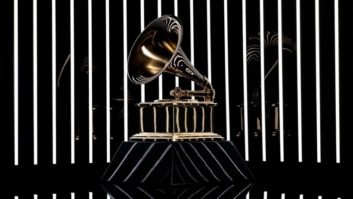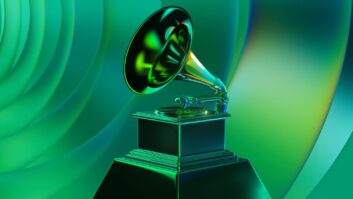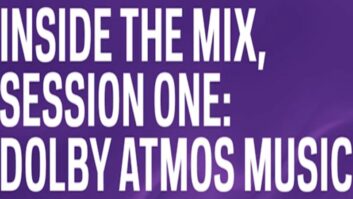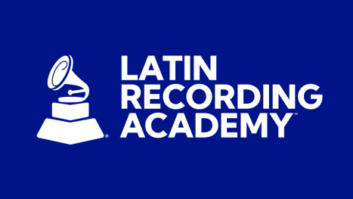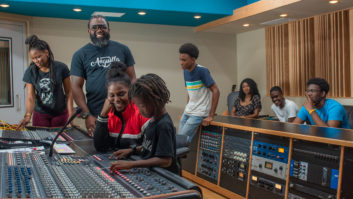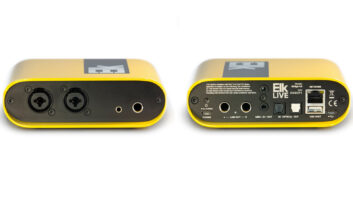The Recording Academy (Santa Monica, Calif.) announced that almost$550,000 will be presented to 27 organizations and individuals in theform of Recording Academy grants. This represents a 27% increase infunding and a 69% increase in the number of award recipients ascompared to last year.
Now in its 16th year, the Academy grant program funds projects thatadvance archiving and preservation of America’s recorded sound/musicheritage, studies related to the impact of music on human development,and research concerning the medical and occupational well-being ofmusic professionals.
“These grants will benefit of wide range of preservation andmedical-research programs that not only protect our nation’s richcultural legacy but also benefit the health and wellness of musicians,children and the public at large,” said Recording Academy presidentNeil Portnow. “The Academy is committed to supporting projects thatdocument the educational and therapeutic effects of music. Music is apowerful force with the ability to inspire, to teach and to heal, andthe goal of many of these programs is to enhance an individual’squality of life. We applaud the efforts of our grant recipients andothers who endeavor to do the same.”
Grant recipients are determined by the Academy’s NationalProfessional Education Committee based on criteria such as merit,uniqueness of project and the ability to accomplish intended goals. Thedeadline for each year’s grants is October 1; applications areavailable at www.grammy.com/grant.pdf.
The following is a list of grant recipients:
Archiving & Preservation
American Music Center Inc. (New York City): restoration,reconstruction, recording, documentation and preservation of 11unpublished musical works for big bands created by legendary jazzcomposer, arranger and performer Thad Jones.
Center for Southern Folklore (Memphis): to catalog music and thestories of blues greats, fife makers, fiddlers, country, jazz andgospel quartets, and others who have been recorded by the Center ofSouthern Folklore in performances or in interviews at the Center or intheir homes.
City Lore Inc. (New York City): restore, archive and disseminatehistoric audio recordings embodying all of the concerts presented bythe pioneering New York City organization Friends of Old TimeMusic.
Country Music Foundation (Nashville): transfer of 78 rpm recordings toarchival CD-Rs and to .WAV or MP3 files stored on a server for publicaccess.
Ginger Group Productions (New York City): create a searchable index ofthe existing filmed and videotaped appearances by the pioneers ofAmerican Music.
Haleakala, The Kitchen (New York City): preserve and modernize TheKitchen’s extensive archival collection of historic audio andvideotapes.
Library University of Hawaii at Manoa (Honolulu): to develop aframework for a “Hawaii Music Archive.” The archive will preserveHawaiian music in all formats and provide public access.
Louis Armstrong House Archives (Flushing, N.Y.): to archivepreservation tape copies of Louis Armstrong materials and to reformatthe tapes on CD to make them available to researchers and visitors atthe Archives.
Naropa University (Boulder, Colo.): reformat 200 hours of recordingsfocused on the connection between poetry and music.
New Orleans Jazz & Heritage Foundation (New Orleans): archive are-recording of 274 oral histories. The interviews were conducted onthe Allison Miner Music Heritage Stage at the New Orleans Jazz &Heritage Festival from 1995 to 2002.
Newark Public Radio/WBGO (Newark, N.J.): transfer tape recordings ofWBGO live recordings to CD.
92nd Street Young Mens and Young Womens Hebrew Association (New YorkCity): a multi-year project to preserve and digitize itsarchives.
Northwest Folklife (Seattle): to identify, preserve, index and provideaccess to more than 30 years of recordings from the annual NorthwestFolklife Festival in Seattle, the KBOO World Music Festivals inPortland, and field recordings of fiddlers and other musicians in thePacific Northwest.
Pacifica Foundation/Pacifica Radio Archives (PRA) (North Hollywood): toundertake a professional preliminary appraisal and assessment of itscollection, resulting in recommendations for best practices andactionable plans for preservation priorities, conservation strategiesand improved access and descriptive documentation.
San Francisco Performing Arts Library & Museum (San Francisco): toclean, re-house and catalog 751 rare acetate instantaneous 16-inchdiscs of the Standard Hour, a radio program that broadcasts liveperformances by many of the greatest conductors, musicians andcomposers of the 20th century.
Sebastian Zubieta (New Haven, Conn.): digitize, edit and make availableon CD and online recordings held at the archives of the InstitutoNacional de Musicologia in Buenos Aires, Argentina.
UCLA Ethnomusicology Archive (Los Angeles): initiate the copying of thearchives collection of Native American field recordings onto bothanalog and digital formats.
University of New Orleans/American Routes: archiving, preserving andpreparing for CD production artist performance and interview recordingsfrom the Folk Masters series now in the American RoutesLibrary.
University of North Carolina at Chapel Hill: preserve and provideaccess to the Goldband Collection in its Southern FolklifeCollection (SFC) Manuscripts Department .
Research
International Foundation for Music Research (Carlsbad, Calif.):research will explore the question: Is there a correlation betweenenhancements in cognitive skills and structural brain growth due tomusic training?
Kenneth M. McGuire, Ph.D. (Tuscaloosa, Ala.): Research will answer thefollowing questions: Is a preschooler’s ability to remember songsaffected by the type of song presentation? And does the level ofchildren’s involvement during the song presentation have an effect ontheir song recognition?
Music Intelligence Neural Development Institute (M.I.N.D.) (Irvine,Calif.): to evaluate, improve and modify the MST Math program before itis fully implemented nationwide during the 2003-’04 school year. Theprogram is designed to help children learn to think, reason and createusing their innate spatial-temporal skills.
Steven Brown, Ph.D./Research Imaging Center (San Antonio, Texas):Functional Magnetic Resonance Imaging (fMRI) of brain blood flow willbe used to elucidate the psychological and neural processes underlyinghuman aesthetic responses to music.
Health and Wellness
Denver Center for the Performing Arts (Denver): to explore the factorsthat cause musical theater performers, opera singers and chorus membersto fatigue vocally.
Medical Program for the Performing Artists/Rehabilitation Institute ofChicago (Chicago): to demonstrate that not only loss of voluntarycontrol of certain hand muscles due to focal hand dystonia can beretrained, but that the underlying causative changes in the brain canbe permanently reversed.
University of North Texas Health Science Center (Fort Worth, Texas): todevelop an educational module for music instructors, music students,musicians and their health-care providers about proper practices toreduce the risk of occupational and potentially career-endinginjuries.
University of Texas at Arlington, Human Performance Institute: pilottest to demonstrate a new task analysis/modeling methodology thatquantitatively relates musician subsystem performance capacities to thelevel of performance that can be achieved in playing a musicalinstrument and identify which capacities are maximally stressed for agiven individual.
For more, visit www.grammy.com/recipients.html.
